It was amazing enough to have Mike Park play the Punks in Vegas 6 Year Bash, but my night was made even better with a quick interview with one of the kings of DIY ska/punk himself. Mike Park has been one of my ska/punk music idols since I started listening to the Chinkees in the 10th grade; 16 year-old Julien could never have imagined that in just a few years she’d be talking to Mike Park about ska, Star Wars, and being Asian in a predominantly white scene. Hell, current Julien can barely believe it.
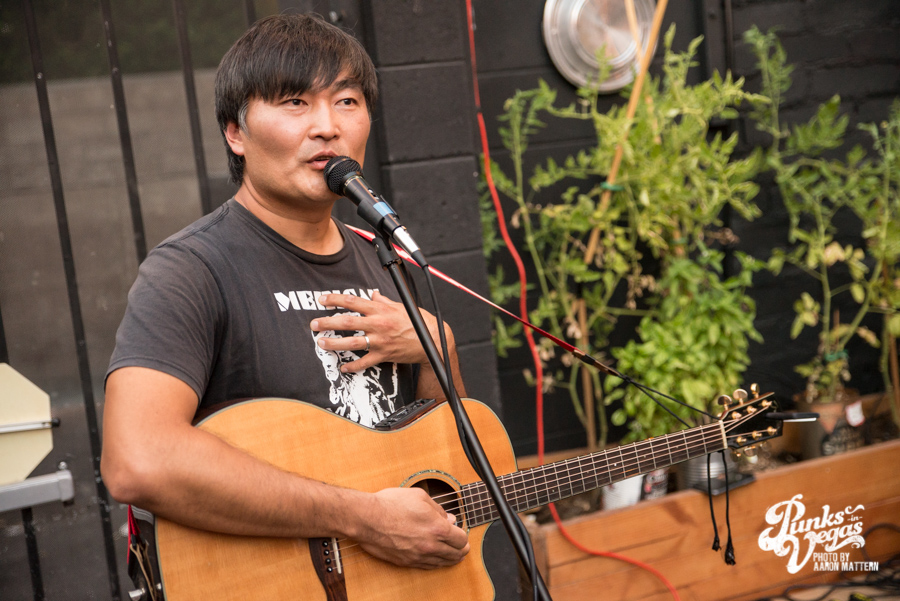
I’m gonna start with the generic [questions]… A big one for me is how your songwriting process has changed. Definitely not talking about girls named Spike anymore. How has [your songwriting process] changed, especially with becoming a father, but also with Ogikubo Station?
“Spike” is 20… 25 years old. So I wrote that song in probably… ‘92? It’s just getting older, too. I started doing acoustic music like, early 2000s just because I didn’t have the time, because I was so busy with Asian Man Records, so the only thing I had time for was just kind of like picking up the guitar and strumming. When you use that medium, it kind of comes out folksy and… I think my style is more indie rock-y, so I was doing that, and then I met Maura through a mutual friend. This woman named Danny Bailey, from my hometown, she’s super good friends with Maura, and we were hanging out, and we just started playing some music, and our voices really worked well together. And so I asked her to record a song, just a one-off, and then I hit her up and asked, “Do you wanna do a project?” [She said,] “Yeah.” So we did.
Cue Dany from Rayner stopping by to thank Mike, fanboy a little bit, and show off his Skankin’ Pickle tattoo, which Mike took a photo of.
I don’t have kids of my own yet. Are your kids interested in ska?
* Mike shakes his head *
No?
They’re too young. They don’t care. You know, I was able to tour on this huge children’s show called Yo Gabba Gabba, and they saw me play this huge 2,000-3,000 seat auditorium, and they were just kind of like, used to it.
They’re just like, “That’s our dad.”
“Oh, that’s Dad.”
They don’t care.
Yeah, they’re not interested at all.
When they’re older, do you want them to help out with AMR?
If they want to. I don’t wanna force it at all. If they’re not into it, that’s totally okay. I’d love [for] them to be into music. If they’re into the same style, that would be great, but… I think it would be rare for a child to really like the exact same thing. I think there’s gonna be a rebellious side, where they’re like “I don’t wanna listen to punk or ska.” They’ll probably be listening to EDM.
Oh, jeez.
You know? They’re gonna go against everything.
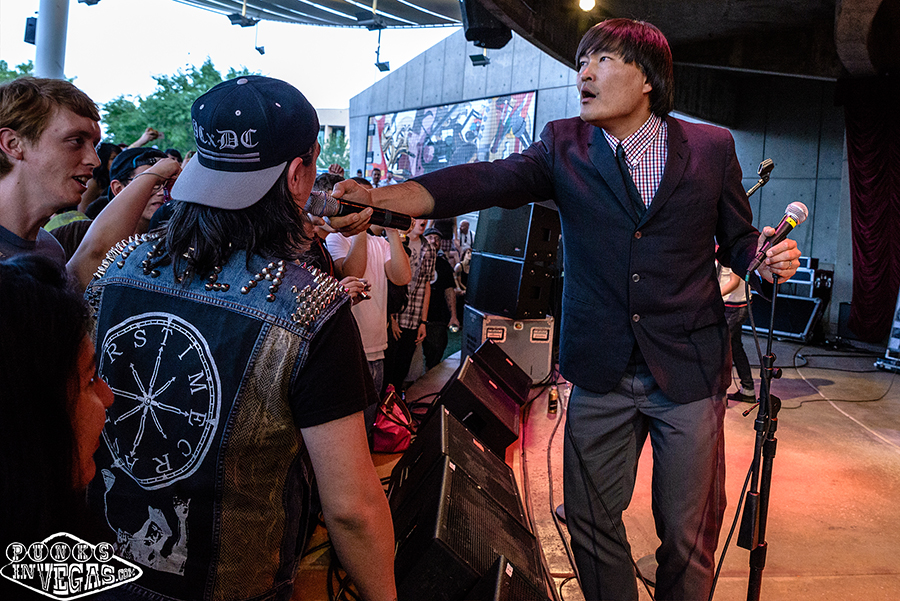
Going off of talking about your children: when you’re not on tour, when you’re with your family, what’s a typical day for you?
Well, if the kids are [in] school, I’ll wake up and I walk the dog two miles. We usually leave at like 7, and then we start yelling at the kids to get ready because they’re just lying around. And we take them to school, and then I go to work. At Asian Man, I usually only work about 6 hours. Then I come home around 3, and then get ready to do dinner, play with the kids. I play in a couple of other bands, so sometimes I have band practice at night. I try to go to the gym.
Oh, man. That’s so funny. You’re kind of integrating “normal life” into it.
I also have to go to a lot of shows. When bands are on tour, when they come into the area, I have to go, no matter what.
Yeah, living in the Bay Area, everybody comes through on every tour.
I go to a lot of shows. Maybe two a week. Usually in San Francisco, so I have to drive an hour.
Is it really an hour?
Yeah, which is a bummer, but what can ya do?
Well, I live in Reno usually, so I drive 5-6 hours to go.
What! That’s insane!
What’s it like seeing… kind of like, the DIY scene back in the ‘80s and ‘90s was skewed towards ska and [your bands], but now it’s kind of, you know, Cayetana, AJJ, what’s that transition like for you?
I think of it as progression.
How do you keep up? Because there’s just so much all the time.
Oh, how do I keep up? Well, it’s funny you should ask that. So, when we started, you know, I actually started in like ‘90 with Dill Records, which was Skankin’ Pickle’s collective label. And then I started Asian Man in ‘96. I mean I was still young then, I was 26 years old then, so I was still integrated in youth culture. And I remember when I was around 34, I wasn’t going to as many shows, I was really out of touch. I was putting out bands who were older, and it wasn’t going so well. And then it was this next wave [where] I had to start going to DIY shows again. So I started going to house shows. I felt awkward because I was older than everyone.
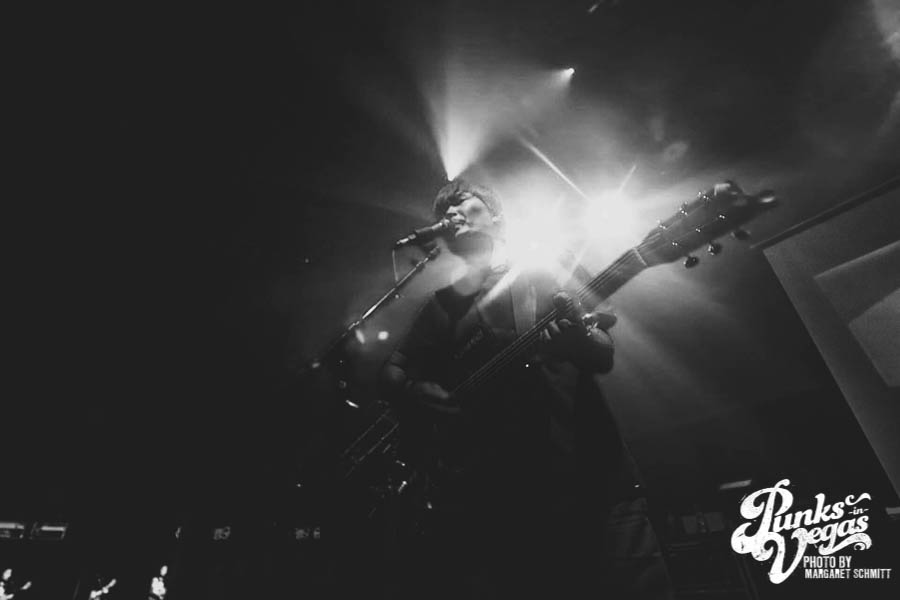
Yeah, I slightly understand that dynamic [due to the Punks in Vegas team age range]. You know, me and this photographer, Margaret, we’re the “younger generation,” so it’s like “Oh, go to Warped Tour! Go to the younger DIY shows!”
Yeah, exactly. So I started going to those shows, and all the kids were nice because most of them knew who I was, so everyone was nice. The next wave was Bomb the Music Industry!, Lemuria, Andrew Jackson Jihad, the WILD, O PIONEERS!!!, then Joyce Manor came along, Shinobu, so now I feel like… I feel like I’m pretty in touch.
You’re getting back in there!
I still go. I still go to house shows. I’m older than a lot of the kids’ parents.
I love seeing that, honestly. You know, eight-year-olds, and then parents. It’s the best thing.
Yeah, I’ve brought my kids to a couple of house shows.
How’d they feel about those?
It’s kinda weird.
“Dad, it’s too loud! I wanna go home!”
Yeah, they just wear earplugs and suffer through it.
Kind of relating to the transitional phase, I don’t want to make you feel or seem old, but I’ve noticed this kind of… I don’t want to call it a “divide,” but you know there’s the older punk scene wherein certain things are okay. You know, let’s say the Descendents saying, “You fuckin’ homo” and bands like the Queers.
I am very, very aware of that. Very, very, very, very aware.
I’m trying not to dredge up old drama with that, but…
It is a divide, because older punks are like, “Fuck you.”
Because it wasn’t seen as a bad thing.
You’ve just gotta think, ya know, even in the punk scene community in the ‘80s, there was a lot of homophobia. There was a lot of racism. Using the word “faggot” was a very common thing. And so that in turn leads to, when you listen to a lot of old punk, there’s a lot of questionable lyrics.
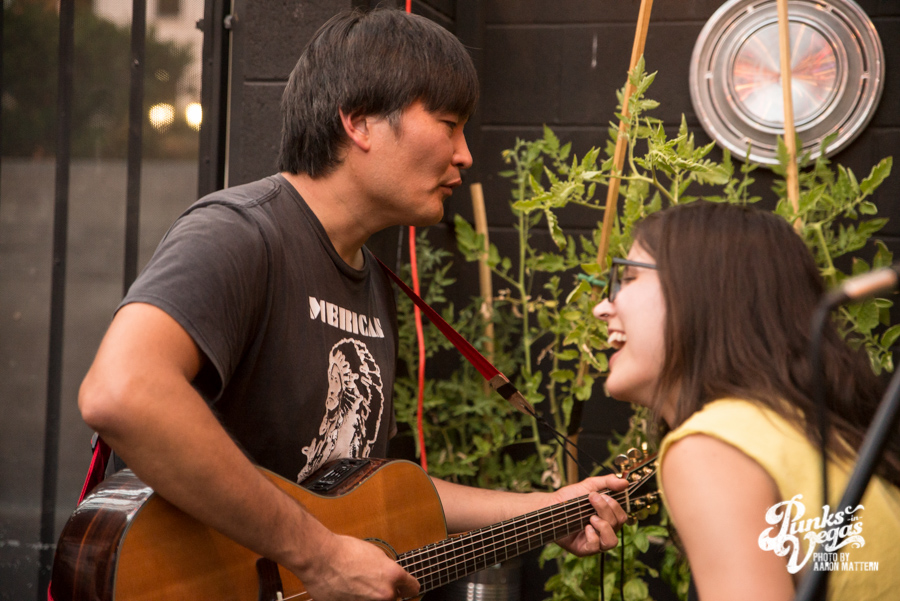
And you see that even now. I was at a show last week, and some girl’s like “Oh, he’s a faggot!” and it was just really awkward.
It is awkward. You wouldn’t hear that if, let’s say, Cayetana was playing. But if it’s like, NOFX, Pennywise, I can see that. It’s just older. It’s an older crowd.
Because that’s seen as okay. Because for a lot of older people, you grow up with that being okay, so you end up thinking that that’s okay. As opposed to like the new “PC generation.” For me, though, the big question is, how do you reconcile that? How do you go to a show, you know, like for me as a queer brown girl going to a show, how do you reconcile “Oh my god, I love this music, I love punk and ska” with not feeling… okay, you know?
I’m not sure, actually. I’ve thought about that a lot, too. Like, what do you do? For me, because I feel like the bands I work with, it’s really clear, the mission statement of Asian Man is an anti-racism philosophy and now as we’ve progressed.
“Just don’t be a dick,” basically.
Like understanding transgender rights. A band like the Queers, who’ve got questionable lyrics and Joe Queer making questionable statements… I’ve known Joe for over 25 years. So the way I deal with it [is], I call him as a friend, and I go, “Joe, do you understand why this isn’t okay?” and we talk about it like adults. And I just teach through example, like “This is why it’s wrong. I hope you agree.” And Joe is a great guy. He’ll say, “I didn’t know.” He’s 56 years old. He’s a good guy, and he’s not so close-minded [as to] where he doesn’t want to learn. He still wants to learn.
That’s good. That’s very good to hear.
A lot of the way he talks comes out misguided, he sounds dumb, but he’s a really good guy.
Sorry to keep the Joe Queer conversation going, but I saw him say once, “I say politics in punk rock,” but to me, [punk rock] is rooted in politics. What’s your take on that?
I think music is a great ingredient to teach ideas. That’s what I’ve always done. I’ve used music, and I’ve been influenced by music and bands, through their lyrics, and I learned about many social justice issues. I, personally, am for it.
Not everybody is.
That’s their prerogative. Not everyone has to. If we all followed each other, we’d just be sheep. Just do your thing. We can’t all be the same. But I like bands that have a message behind them.
I feel like that’s becoming more okay, especially in the DIY scene. At least from what I’ve noticed, a lot of smaller bands are coming out and… I don’t know if you know Diet Cig, but I saw them a couple months ago and they had had a little spiel, and it was really cool to see that. And I think more bands are becoming… I don’t wanna say “safe space,” because that phrase has become so destroyed, but that’s what it is, I think. Not to make this into a speech, but that’s what shows are, you know: a space for everyone to come out and have fun.
Yeah, that’s what we want. It’s important.
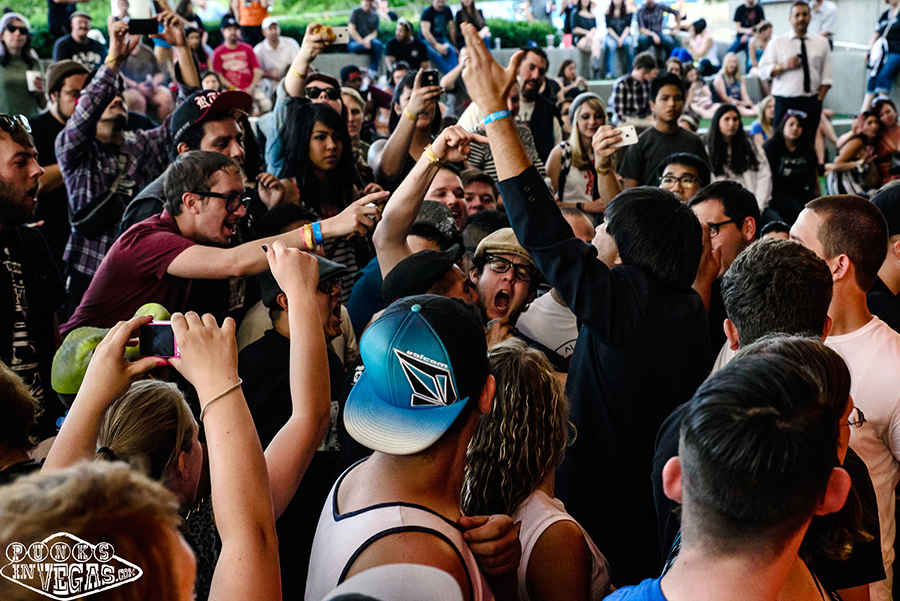
I have one more political question: I actually read an interview with you from like 2003 or something like that, and you said that you don’t really see yourself as an Asian-American spokesperson.
Really? I’d have to go back and read that. I don’t know what the context was.
Maybe it was their phrasing. It was like a college kid interviewing you over the phone, like “Hey, I’m doing a paper.” I was surprised by that. Like little 16 year-old me, jammin’ out to “Asian Prodigy,” I felt a connection to that.
Listen to the solo records. It’s all Asian-themed songs about growing up and dealing with racism. Dealing with strict Asian parenting. Dealing with racism, dealing with everything. Plus, I grew up in a predominantly white area. I grew up in a small suburb of San Jose. It’s a very affluent area. In my class, there were three Asian kids. That’s it. One African-American, two Hispanics. That’s it.
How was that? Besides the obvious.
I can remember early on, it was stupid, but wishing I wasn’t Asian.
Me, too. Sorry I’m asking all of these, but you know, the punk scene is mostly white people, so I was like, “Yes! Another Asian person!”
No, I get it. I totally wanted to be white.
I definitely understand that. Tonight you played “Asian Prodigy” with Maura to a mostly white, couple of Latinos in there crowd, what’s that like?
Not everyone can relate, obviously, but it’s for people who can relate. I think it’s a good song. They can see, they can hear a little bit into my past and what I had to go through. Ideally, I’d like it to be more diverse, but there’s no getting around the fact that it’s white music. If we wanna see Asian-Americans, we’ll go to a hip-hop show, if we wanna see diversity.
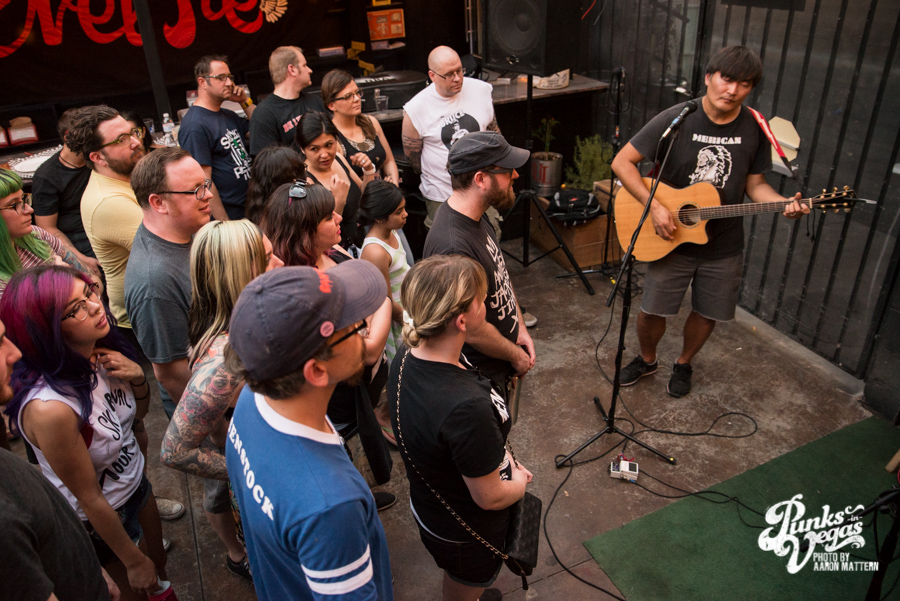
Yeah, that’s what’s frustrating.
If you go to a house show, it’s all white people. Those are the facts.
That’s kind of been my struggle. At least in Vegas, there are a lot more Latinos, which is nice to see. And the OC ska scene, they have a lot of Mexican ska.
Oh, LA, Southern California for sure.
I don’t know if you’re allowed to tell me this, but are their any records that you’re really looking forward to releasing through AMR?
There’s this band called Hard Girls, awesome band. They actually finished the record almost two years ago. And Asian is a small label. People have this idea that we’re a bigger label, because we’ve put out some big records. I feel so strongly about this band, I was trying to get them signed to a bigger label. That was delayed, so I was like, calling labels, like “Dude, this band is so good, put ‘em out.” And [the band] just said, “Mike, just put it out. We want the record out.” So that’s the record that’s coming out October 6th.
Oh, that’s rad!
I’m excited about every record. That one- I’ve known them for so long, they’re just good people. The Smokin’ Popes are gonna do a new record.
Oh, really?
It’s gonna be amazing.
How did you find [the band] Dog Party?
Dog Party was all through Kepi [Ghoulie]. Kepi’s from Sacramento, and they’re from Sacramento. Kepi was friends with their parents. He’d have them open up for him. They’re such good musicians, he was like, “Do you wanna back me?” They were his backing band on a few tours. So that’s how I met Dog Party, through Kepi.
That’s really cool! Because I’m like, right between their ages, or maybe I’m Gwennie’s age or so.
Lucy just turned 19, and [Gwennie is] 21.
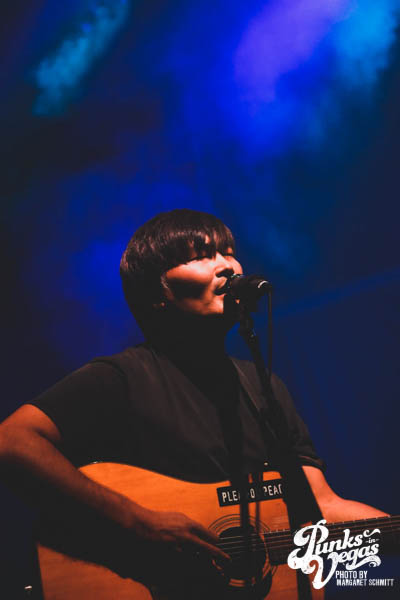
Oh, man, yeah I’m right between them. So it’s really cool to go out and see girls in the scene, and they’re really good. Really musically good.
Really good. Yes.
This is kind of a dorky question to end on… You’re kind of known for being a Trekkie, a Star Trek fan, but how do you feel about Star Wars and StarGate?
I love Star Wars. I get really excited. I’m old enough so the first run- I was alive when the original Star Wars came out. Which was in 1970…
‘77 or ‘78. (I can’t believe I forgot!)
Let’s say ‘77. Anyway, I was old enough for that, and then [when] the Empire Strikes Back [came out], I cut school to go opening day.
Dude! That’s so cool!
It’s exciting. The Empire Strikes Back, I remember when the movie ended, just the adrenaline going so hard, I was like, “I can’t believe it. That was insane!” I was so excited for Return of the Jedi. Yeah, I’m down.
Those are all of my questions, so thank you so much!
Cool! No problem!
-Julien Boulton
Photos by Aaron Mattern, Emily Matview and Margaret Schmitt

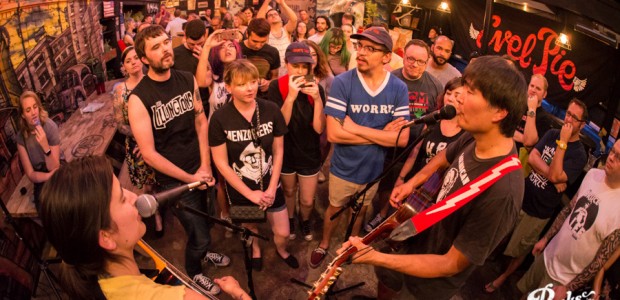



No Comments